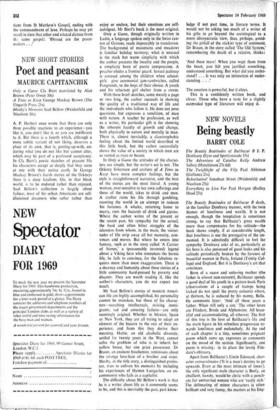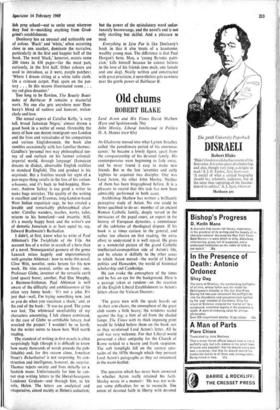NEW NOVELS
Being beastly
BARRY COLE
The Beastly Beatitudes of Balthazar B J. P. Donleavy (Eyre and Spottiswoode 35s) The Adventure of Catullus Kelly Andrew Salkey (Hutchinson 27s 6d)
The. Twighlight of the Vilp Paul Ableman (G ollancz 21s) Rebarbativel Jonathan Street (Weidenfeld and Nicolson 25s) Everything to Live For Paul Horgan (Bodley Head 25s) The Beastly Beatitudes of Balthazar B deals, in the familiar Donleavy manner, with the twin themes of loneliness and wealth. It is not enough, though the temptation is sometimes strong, to say that Balthazar's great wealth more than compensates for his solitude—the book shows simply, if at considerable length, that loneliness is not the prerogative of the un- monied. It is admittedly difficult to feel the sympathy Donleavy asks of us, particularly as his hero is also possessed of good looks and his solitude periodically broken by the favours of beautiful women in Paris, Ireland (Trinity Col- lege) and England. But it is Donleavy's art that convinces.
Born of a suave and unloving mother (the father is almost non-existent), Balthazar spends a good deal of his youth in a picture-book Paris (observations of a couple of tramps being kicked do not spoil the pretty ;colours) where, at thirteen, he is seduced by his nanny, Bella. He comments later: 'And all these years a father. When still only a son.' The other loves are Fitzdare, Breda and Alphonsine. All beau- tiful and accommodating, all ethereal. The first of this trio is the love of Balthazar's life and the main figure in his relentless progression to- wards loneliness and melancholy. At the end of each chapter is a tiny, sometimes poignant poem which sums up, expresses or comments on the mood of the section. Significantly, one poem is missing: in its place the lovely Fitz- dare's obituary.
Apart from Balthazar's Uncle Edouard, char- acter extraordinaire ('It is a man's destiny to go upwards. Even at the most intimate of times'), the only significant male character is Beefy, an ebullient, bawdy, would-be cleric with a pench- ant for unmarried- women who are 'vastly rich.' The delineating of minor characters is often brilliant and very funny, the masters at his Eng- lish prep school—out to smite smut wherever they find it—matching anything from Grad- grind's establishment.
Donleavy has an unusual and noticeable use of colour. `Black' and 'white,' often occurring close to one another, dominate the narrative, particularly in the first and happier half of the book. The word `black,' however, occurs some 200 times in 438 pages—for the most part, curiously, in the first half. Other colours are used to introduce, as it were, purple patches: 'Where I dream sitting at a white table cloth. On a crimson carpet. Pink spots on the pot- tery . . . In this mauve illuminated room . . . my red glass decanter.'
Too long to be flawless, The Beastly Beati- tudes of Balthazar B remains a masterful work. No one else gets anywhere near Don- leavy's blend of sadness and humour, melan- choly and love.
The sexual capers of Catullus Kelly, 'a very tall, broad Jamaican Negro,' almost drown a good book in a welter of sweat. Ostensibly the story of how one decent immigrant sees London and the lives and vicissitudes of his compatriots and various Englishwomen, the book also rumbles occasionally with less familiar themes: Catullus's 'personal two way philosophical sur- vey of and outlook on his former colonial- imperial world, through language' (Jamaican dreams in dialect, observable English realities in standard English). The end product is his
negritude. But a fruitless search for signs of a pan-negro thing results in the loss of his weltan-
schauung, and it's back to bed-hopping. How- ever, Andrew Salkey is too good a writer to make huge mistakes. The quality of the writing is excellent and in Erasmus, long-London-based West Indian expatriate sage, he has created a lovable and remarkably philosophical char- acter. Catullus wanders, teaches, works, talks, returns to his homeland—and insanity. • Still, it's a mostly happy book and the writer's use of demotic Jamaican is at least equal to, say, Edward Brathwaite's Barbadian.
1 didn't, at first, know what to write of Paul Ableman's The Twighlight of the Vilp. An
account less of a writer in search of a hero than of a novel. Nonsequential goonery of the genre Leacock mixes happily and unpretentiously with genuine Ableman: how to write this novel.
Clive Witt, novelist, seeks heroes for his new work. He tries several, settles on three: one, Professor Glebe, inventor of the versatile earth (and space) borer; another, Pad Dee Murphy, a Burmese-Irishman. Paul Ableman well aware of the difficulty and ambitiousness of his often very funny book : 'It's not a joke. It's just that—well, I'm trying something new, just as you do when you vaccinate a shark,' and, at the end of the book : 'It was no good. The game was lost. The whimsical unreliability of my characters amounting, I felt almost convinced, in the case of Glebe to certifiable lunacy, had wrecked the project.' I wouldn't be so harsh, but the writer seems to know best. Well worth reading.
The standard of writing in first novels is often surprisingly high (though it is difficult to know how many thousands of words precede the pub- lishable) and, for this reason alone, Jonathan Street's Rebarbativel is not surprising. lts con- struction and intelligence, however, do surprise. Thomas rejects society and lives initially on a Scottish moor. Unfortunately for him he can- not stop writing letters to the liberal-bourgeois Londoner Graham—and through him, to his wife, Helen. The letters are analytical and vituperative, aimed mainly at Helen's-seduction; but the power of the epistolatory word unfor- tunately boomerangs, and the novel's end is-not only startling but skilful. And a pleasure to read.
Everything to Live For is like Donleavy's book in that it also treats of a handsome, wealthy young man. The difference is that Paul Horgan's hero, Max, a 'young Byronic patri- cian,' kills himself because he cannot believe in the love of his friends (one male, one female and one dog). Neatly written and constructed with great precision, it nevertheless gets nowhere near the gentle power of Balthazar B.



































 Previous page
Previous page